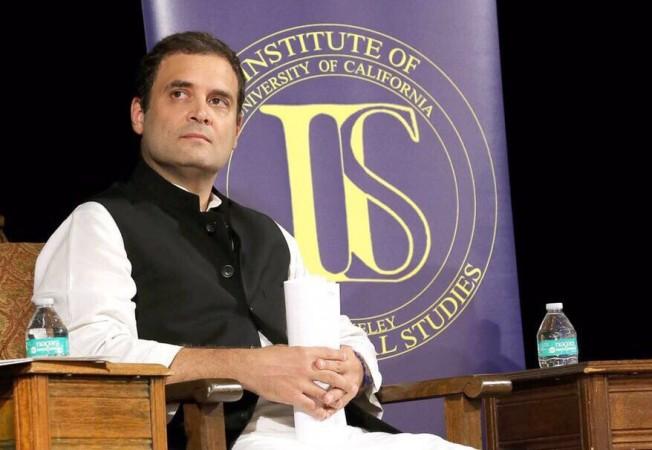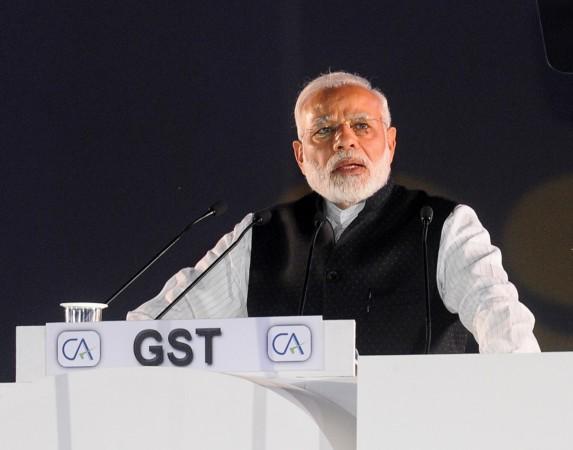
Politics in India has a definite pattern. Here, leaders thrive on the opponent's weaknesses and whoever is in the Opposition has a better chance of achieving the goal because he/she has a lesser baggage of accountability to carry, unlike the ruler. The fate of Indian democracy is now determined by negative verdicts and this makes anti-incumbency a crucial factor.
One cannot deny the fact that Prime Minister Narendra Modi is still by far the most popular leader in India. The Indian electorate is still not ready to visualise any alternative to the current prime minister and the verdict of the 2019 Lok Sabha election still looks settled unless hell breaks loose.
But at the same time, the observers of Indian politics could also start believing that Modi has committed a big blunder in the economic sphere and that has a potential to give the BJP a scare in the days to come.
Modi is still the tallest leader but his govt's economic performance hasn't impressed
In fact, the three years of Modi's rule has created certain hardships for the Indian economy and the common people and this has given Congress vice president Rahul Gandhi an opening. So far, Rahul has made the right use of the opportunity on the soils of the United States where even difficult-to-impress experts said they were "pleasantly surprised" by the former's takes on things.
Will negative verdict hurt Modi badly in the 2024 elections if not in 2019? Politics is a funny game in which nobody is invincible.
Anti-incumbency has dominated India's electoral politics since 1977 when the Congress had lost power at the Centre for the first time (the party had also seen adversity in 1967 in various states but not at the Centre). In 1980, the Janata coalition collapsed while in 1989, Bofors saw Rajiv Gandhi losing power. The next 10 years saw only one government lasting a full term and in 2004 and 2014, India witnessed two governments, led by the BJP and Congress respectively, failing to overcome anti-incumbency challenges.
Modi stormed to power in 2014 not just by riding on the failure of the UPA government but also a massive propaganda machinery. He, therefore, always had the pressure to meet the high promises he made to the people three years ago and after three years of rule, even a decent performance by the prime minister is not really impressing the common people, particularly in the wake of demonetisation and GST moves that have hit their economic normalcy.
Modi's 3-year rule gives Rahul an opening just as Manmohan's rule had helped Modi
For Rahul Gandhi who has struggled thus far to tackle the propaganda machinery, this has been a golden opportunity, especially to reach out to experts and the Diaspora with his questions that are not direct but yet sharp. Rahul Gandhi is just doing Modi had done during his ascent three years back and expand his popularity base. And the Congress vice-president has made his game more interesting by throwing in phrases of self-criticism. For those who find Modi over-confident and unapologetic, the Congress leader's humbleness will certainly strike a chord.

Rahul Gandhi's strategy, in fact, loosely reminds one of the same Indira Gandhi had adopted post her defeat in the 1977 elections.
While Indira's arrest by the then Janata government which was not stable itself had revived the sympathy for the late leader, the constant trolling of Rahul Gandhi by a powerful regime which is increasingly falling short of the expectations on the economic front could also turn the game in no time if the over-confident rulers do not address the problems on the ground soon.
Rahul's US talks pleasantly surprised many because he is speaking in people's language
Rahul Gandhi's US trip of 2017 has reportedly created some discomfort for the BJP which has refused to give him any importance so far. This is precisely because Rahul Gandhi has started asking questions that have started haunting the common people – just like Modi had done prior to the 2014 polls.
In 2004, Sonia Gandhi came from nowhere to checkmate ABV
In a populism-loving democracy like India, language matters more than merit and the Congress vice-president, despite his almost no show in comparison to the saffron party in the recent elections, has found a much-needed boost to his own prospects. We have seen in the past how even a popular moderate prime minister in Atal Behari Vajpayee had to bite the dust because of political undercurrents and Sonia Gandhi led from the front to bring a hapless Congress back to power.
Politics is a funny game and even a superman like Narendra Modi is not above its rules.

















